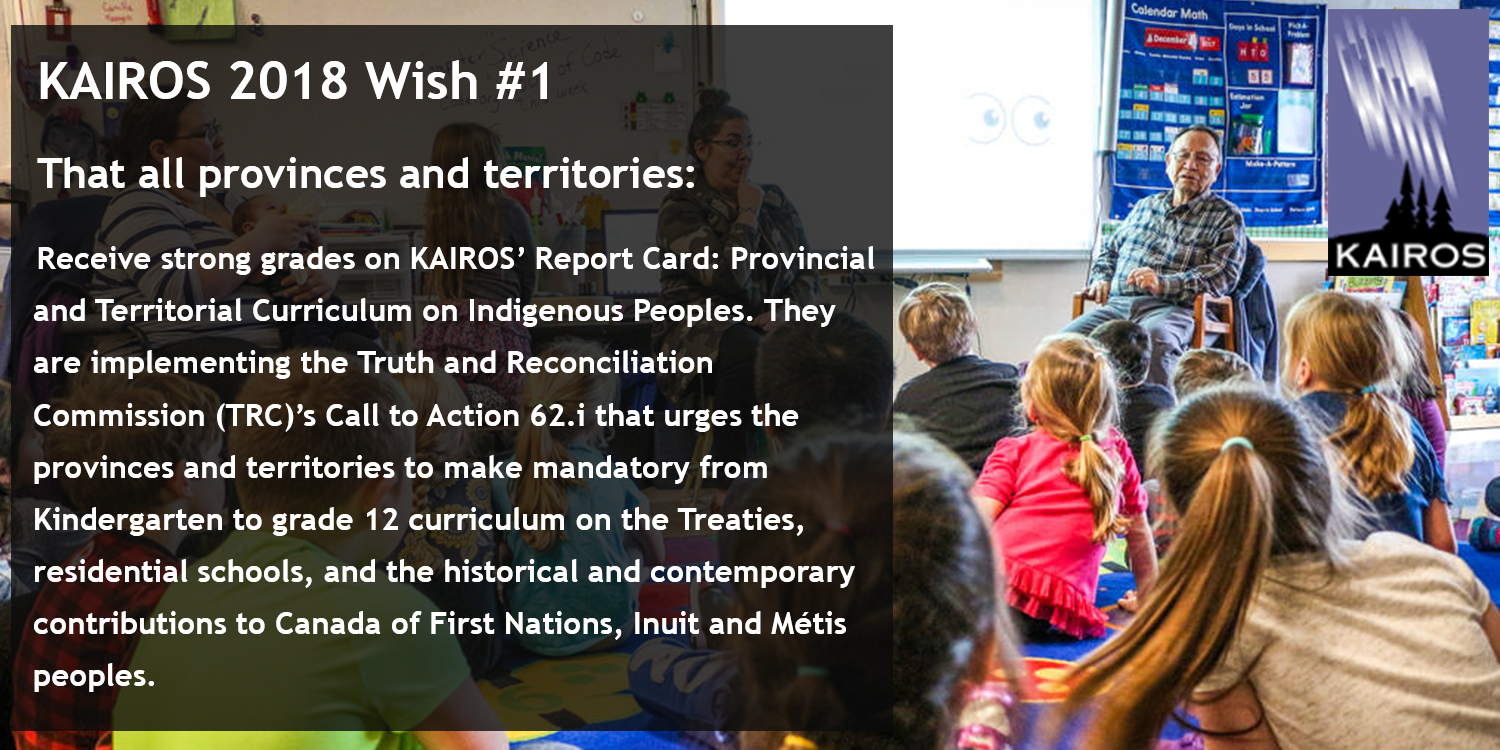Always striving for extraordinary change, KAIROS expects bold new provincial and federal policies this year that will advance human and ecological rights. On December 31, 2018, KAIROS will truly celebrate if all (or at least most) of the following are implemented.
That all provinces and territories:
- Receive strong grades on KAIROS’ Report Card: Provincial and Territorial Curriculum on Indigenous Peoples. They are implementing the Truth and Reconciliation Commission (TRC)’s Call to Action 62. KAIROS urges the provinces and territories to make mandatory — from Kindergarten through grade 12 — curriculum on the Treaties, residential schools, and the historical and contemporary contributions to Canada of First Nations, Inuit and Métis peoples.
That the Parliament of Canada:
- Enacts Bill C-262, an Act to ensure that the laws of Canada are in harmony with the United Nations Declaration on the Rights of Indigenous Peoples.
And, that the Canadian government:
- Fully implements TRC Call to Action 93, which calls on the government, in collaboration with national Indigenous organizations, to revise the information kit for newcomers to Canada and its citizenship test to reflect a more inclusive history of the diverse Indigenous peoples of Canada, including information about the Treaties and the history of residential schools.
- Introduces new legislation for a federal environmental review process that requires Indigenous peoples’ free, prior and informed consent before projects can proceed on their territories.
- Reassesses the impact of new fossil fuel pipelines and liquefied natural gas export terminals on Canada’s ability to fulfill its commitment to fight climate change.
- Introduces an ambitious timeline and strategy to end all subsidies to fossil fuel companies and invests in a just transition to a clean energy economy for affected workers and communities.
- Announces the end of temporary migration and returns to permanent immigration as a strategy for nation building and meeting labour market demands. Immediately ends long delays in processing permanent residency applications for migrant caregivers, provides open work permits to all migrant workers, and grants them permanent residence and access to support services in Canada.
- Signs and ratifies the International Convention on the Protection of the Rights of All Migrant Workers and Members of Their Families.
- Appoints a fully independent and resourced human rights ombudsperson with the power to investigate human and ecological rights violations at the hands of Canadian mining companies. The ombudsperson takes into account the unique perspectives of Indigenous women and addresses the particular impacts of resource extraction on women.
- Facilitates access to Canadian courts for overseas plaintiffs who claim harm by the actions of Canadian mining companies.
- Funds and implements the Feminist International Assistance Policy (FIAP), focusing its support on grassroots organizations and diverse, responsive funding mechanisms that allow for effective long term support for civil society partners. To ensure that FIAP is fully funded, the federal government increases its foreign aid from 0.26 per cent of gross national income to 0.7 per cent.
- Complies with United Nations Security Council Resolution 1325 on women, peace and security, and subsequent similar resolutions through the implementation of its new National Action Plan on Women, Peace and Security in the context of FIAP.
Image: KAIROS Canada
Like this article? Please chip in to keep stories like these coming.





